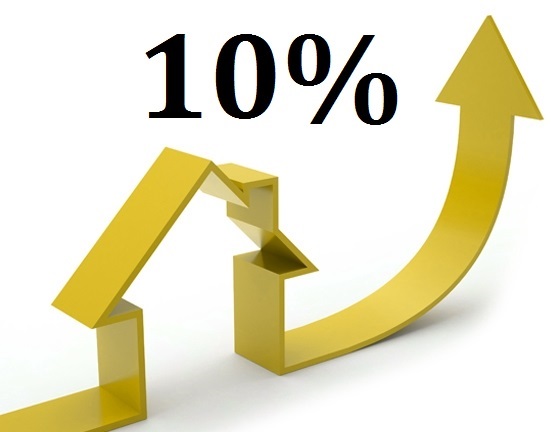Or is it simply a slow news day?
Monday marked the first day that buyers will have to make a minimum down payment of up to 10% on the price of houses over $500,000, but as those of us who read beyond the headlines are aware, that’s a sliding scale, that sounds a lot worse than it is.
I’m of the opinion that the new 10% minimum won’t have as much of an effect as other people might suggest, and that the hot January market cannot be attributed to buyers “hurrying up” to get ahead of the new mandatory minimum…

Anything can be “news” by simply reporting it.
Have you ever been watching, listening to, or reading something, and then suddenly thought, “What the hell is this? Why is this relevant?”
The cynical phrase, “Must be a slow news day” is often used to describe those human-interest stories, like a cat stuck in a tree, or something else that really isn’t impactful, but for some reason, is being reported on.
But sometimes, seemingly-important sounding stories are disguised as news, when in fact, there’s no real story there.
Yes, Monday marked the first day under new mortgage policy enacted by the CMHC.
Yes, buyers will now have to make a slightly higher down payment on the purchase of houses between $500,000 – $999,000.
Yes, this is something that will impact people, and thus should be reported.
But the stories I’m reading, the coverage I’m seeing, and the media that will undoubtedly follow in the coming days is an incredible overreaction, and in some cases, the coverage is irresponsible.
There was a lot of coverage on Monday, but a CBC piece caught my eye: “Mortgage Rules Requiring 10% Down On Canadian Homes To Kick In Today”
The excerpt that I wanted to explore is as follows:
–
Toronto real estate agent Sonya Côté said first-time homebuyers were feeling the pressure to put their five per cent down on homes while they still could.
“Coming up with $3,000 or $5,000 or $7,000 more for a down payment to get in there for the first time is a lot of money for first-time buyers,” she said.
The rules change meant Côté was able to sell a row house that hasn’t been renovated, and with no parking, in a week.
“That drove traffic through this place like a circus,” she said of the new regulations. “We had 103 showings, 13 offers and it went for $149,000 over asking.”
The agent predicted real estate traffic will slow now with first-time buyers facing stricter regulations.
–
Now first of all, I mean no disrespect to the agent who is being quoted. It’s not her comments that I take issue with, but rather the CBC’s drawing of a conclusion.
This part in particular: “The rules change meant Côté was able to sell a row house that hasn’t been renovated, and with no parking, in a week.”
That’s absolute nonsense.
It’s misleading, and it’s irresponsible.
First of all, “rowhouses that haven’t been renovated, and with no parking,” are not difficult to sell in Toronto. Anything is saleable in this market, and anything will, in fact, sell.
Secondly, “in one week” is not impressive, given that every single freehold property that is listed for sale in the central core, with a “set offer date,” takes offers 6-8 days after the property is listed.
To say “the rule change meant Côté was able to sell a row house that hasn’t been renovated, and with no parking, in a week” is misleading.
It’s not the rule change that meant this house sold in a week.
It’s the Toronto real estate market.
13 offers on a house? $149,000 over asking?
Whoop-dee-freaking-doo.
We call that “Tuesday” in Toronto, meaning it’s “any day” and “every day.”
I’m of the opinion that the change to the minimum down payment rules had absolutely, positively, zero impact on the sale of this “un-renovated, rowhouse with no parking” that managed to sell for over-asking, in a market, where every goddam houses sells over asking.
This is the problem I have with media trying to create news stories.
The CBC took two things, and created a cause-and-effect relationship between them.
1) The mortgage rules are changing.
2) This house sold for $149,000 over asking.
Ergo, the mortgage rules changes caused this house to sell for $149,000 over asking.
You can’t simply create a story like that, however. It’s not fair.
How about this:
1) You were reading this blog.
2) You found a quarter on the street.
Ergo, reading this blog results in immediate financial gain.
An otherwise uninformed reader is led to believe that the mortgage rules changes impacted this sale, when in fact it was simply the way the article was written.
When the new mortgage rules were first announced last December, I got calls from three different reporters, asking me if I felt there would be a “rush” to buy homes.
I told them that I didn’t have a single existing client who felt that he or she would be impacted and thus needed to speed up the property search, nor did my phone ring once from a new buyer looking to get into the market over the coming three months.
The funny thing is, I didn’t feel like any of the reporters were asking me a “yes or no” question. I felt as though they already had their minds made up: that this mortgage policy change will affect the market, and they were simply calling around to find a Realtor that would say “yes, it will.”
I wasn’t surprised at all to see all three articles published without any of my quotes, but rather with quotes from agents, mortgage brokers, or buyers who were talking about how this would impact them, or how much more it would cost to buy a home.
And how much more does it cost to buy a home?
“From 5% to 10%” is how the mortgage policy change is being reported, for the most part.
But in fact, the 5% minimum still applies to the value up to $500,000, and it’s only the balance up to $999,999 that goes from 5% to 10%.
So the buyer of a $700,000 house, who would have put down 5% or $35,000 before, now has to put down $45,000. That’s 5% of $500,000, plus 10% of the balance of up to $700,000 – which is 10% of $200,000.
So how many buyers out there are impacted by this?
How many buyers are price sensitive to the point of being able to buy that $700,000 home with their $35,000 down, but not if $45,000 is needed?
I’m not going to suggest that $10,000 is insignificant.
But how many buyers make the minimum 5% down payment to begin with?
I don’t have numbers on this, but I’d speculate that perhaps one in five of my clients does so.
So let’s assume that 20% of people are making the 5% minimum down payment. Now how many of them are priced out when the down payment, in this example, goes from $35,000 to $45,000? I’d guess perhaps one in ten.
So that’s 10% of 20%, or 2% of the buyer pool that’s affected, and let’s remember that this isn’t 2% of the entire buyer pool – it’s only those who are looking to buy between $500,000 – $999,999.
And again, this is my opinion, and I’m providing these numbers. This is far from fact, I’ll be the first to admit it.
Maybe the numbers are higher.
Maybe 2% is way off. Maybe it’s 5%. Maybe it’s 10%.
But either way, we’re still not talking about a large percentage of the buyer pool.
And this is still only 2%, 5%, or 10% of buyers for specifically properties between $500,000 – $999,000.
Buyers under $500,000 remain are unaffected.
Buyers over $1,000,000 remain unaffected.
There were 4,672 sales in Toronto this past January.
2,004 of those sales were between $500,000 – $999,000.
2,142 buyers of properties under $500,000 were unaffected.
526 buyers of properties over $1,000,000 were unaffected.
And let’s not forget that on this sliding scale, the impact is minimized the closer the property is to $500,000.
Of those 2,142 sales between $500,000 – $999,999, the highest proportion – 691 of those sales, were between $500,000 – $599,999.
So even if we assumed ALL of those sales were at $599,999, the buyers are still only going from a $30,000 down payment to a $35,000 down payment.
Call me crazy, but I just don’t see this resulting in a huge impact on the market.
I know that $5,000 is a lot of money.
But I’m not convinced that nearly as many buyers are making 5% down payments as critics might have us believe, and I’m not convinced that they’re ALL exceptionally price-sensitive.
I’m not saying this as a biased real estate agent with an agenda and an axe to grind.
I’m saying this as an active real estate agent who hasn’t had one, single client bring up this subject…
































Appraiser
at 7:18 am
Almost all main stream news is based on anecdotes.
The CBC piece was no different – it was just awful. Imagine coming to a conclusion based on one sale out of 2,142 and the opinion of one out of 43,000 registered real estate agents.
So scientific, positively irrefutable.
Craig H.
at 8:02 am
So the implication from the article is that people are willing to bid $50k?, $75k? $100k? more than they would have otherwise to avoid coming up with another $5-10K in down payment once the rules come into place? Of course the incremental $100k requires an incremental $5k in down payment anyway…
Mike
at 8:59 am
The new rules have nothing to do with slowing down the market or “protecting buyers”. They’re put in place so that the Government can stand up when prices retract and say, “thanks to steps taken by this Government, we have reduced the exposure of the Canadian taxpayer to defaults relating to the CHMC”
condodweller
at 12:15 pm
the cynical side of might agree with you, but I would like to hope that they are actually trying to help people and stabilise the market.
Marina
at 9:50 am
If the market will not be affected, then there is no story.
Real estate articles garner a lot of interest, so the journo had to create a story. I would have been surprised if they didn’t.
And let’s face it, they are covered either way. If nothing happens (which is the most likely), then the measures were not strong enough and the government did not do enough to cool the market. See – another story.
If coincidentally the market cools (and it would have to be a coincidence because I’m with you on the zero impact of this change), then they get to say “see – we got it right!”.
David, what would you estimate the current under-supply to be? I.e. how much of the buyer pool has to be taken out for prices to start to either flatline or go down? Because it certainly is not 2%. Or 5 or 10 for that matter.
condodweller
at 12:13 pm
Journalists have two objectives. One is they have to fill the pages or the hours with “stuff”, the second is they have to sell papers or get you to watch their show. Now consider that negative news sells better, hence, the majority of news is negative and sensationalistic. Now put yourself in the writer’s shoes. Would you report this as the change which had 0 effect or would you find anecdotal evidence and spin it as if it did have an effect?
The question begs to be asked here is what the fair market value of this house was and whether or not it sold a significant amount above fair market value?
With regards to % of buyers effected it may be a good material for a future post to analyse the cumulative effects of all the previous rule changes. It may be only 2% now, but what’s the total effect? If it was 10-20% would that be significant?
Also, you had a post recently on how 3 bedroom houses appreciated about $100,000 in the last few months. Can we chalk it up to demand?
If I was in the market to buy a house in the 500k-1 million range I think I would step up my efforts to close before I have to spend an additional 5-20k. Would I bid an extra $100k to save that 5-20K? I don’t know.
Regarding the extra money one has to come up with now being insignificant; since when is even $5,000 insignificant? Even if you are a high income earner that’s about $10,000 pretax of your earnings! I realize we are getting desensitized by seeing all these huge numbers when it comes to house prices, but comon, $20,000 is about minimum wage. That’s an entire year’s work for many people.
Ed
at 5:26 pm
Condodweller you wrote-If I was in the market to buy a house in the 500k-1 million range I think I would step up my efforts to close before I have to spend an additional 5-20k. Would I bid an extra $100k to save that 5-20K? I don’t know.
Really, you don’t know? You would even for a second consider spending an extra 100k now so you wouldn’t have to come up with an additional 5-20k later?
condodweller
at 7:58 pm
@Ed Well if you listen to the bulls around here who say prices are on a continuous march upward, perhaps in a month you’d have to pay an extra 120k in which case it would have been worth it. I said I don’t know because I’m not in the market, therefore I’m not under pressure to make a decision. I don’t think I can answer that truthfully because you are right, logically it doesn’t make any sense. Perhaps now that Feb 15 is passed prices will come back 20%. Who knows. Perhaps people who bought in January at those prices will be the greatest fools in hindsight.
I heard the RE market was up 17% (correct me if I’m wrong and it was volume, not price) in January which is on top of the 9% yoy last year. Even the 9% is about 5 times inflation, but 17% in a month is entering nutty territory. Never mind enter, it is nutty territory.
Julia
at 5:08 pm
I think that if $5,000-10,000 is going to make a difference to you, you can’t afford the house!
condodweller
at 8:05 pm
That’s not ture. If you qualify for a mortgage and you have a 30K down payment to buy a house today, and you can save 1k each month, it would take you 5-10 months before you could look at buying the same house if it hasn’t gone up in price. Now if that house is 100k more today, then you are right that person couldn’t afford it anymore unless the bank is willing to lend them an extra 95k and they can carry that extra amount AND they can beg and borrow that extra 5k downpayment required for the extra 100k.
Wut
at 12:21 am
Nobody buying a million dollar home can only save 1k a month. That’s absurd.
condodweller
at 9:32 am
Julia indicated 5-10k which means a 600-700k home. At 5% down on a 700k house, you need a 133k income to carry the mortgage. How many families in that income range do you know that can save an additional 1k/month? Ideally, if you are taking on that kind of a mortgage you should have 5-10k minimum emergency savings that you could use in a case like this but then again, how many people do you know with that income that has 5-10k in liquid assets?
Thuy Doan
at 4:22 pm
Always love seeing the discussion that’s on your blog.
http://www.commercialrealestate101.blogspot.ca